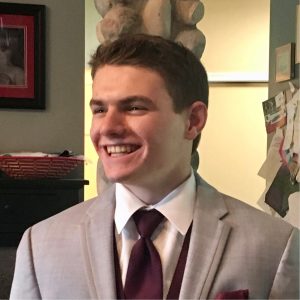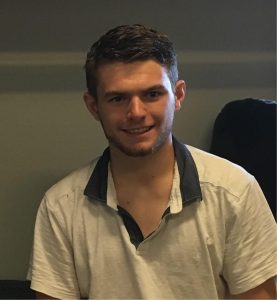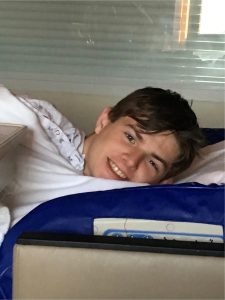#LIFESaver Families
#LIFESaver Families Profile: Timothy John Morrison, Jr - "Jack"



What is your loved one’s full name:
Timothy John Morrison, Jr – “Jack”
What was their date of birth & their age at the time of their passing?
July 18, 2000; 19 years-old
Tell us about your loved one: What five adjectives best describe the positive they brought to this world, that now shines on in how they impacted you and all those they touched?
Brilliant, Witty, Competitive but Gracious, Faith-filled, Loyal, and Generous.
Gentle while Strong.
To the extent that you feel comfortable, please tell us what you believe were the circumstances/contributing factors around your loved one’s passing.
Jack had developmental issues as a young child — OT issues, speech issues, attention/impulsivity, and at the same time was very intelligent and aware. If people were unaccepting or impatient with him, he noticed. But he remained spirited and engaging. In first grade, he was diagnosed with celiac disease, which set him apart in a further way (before being gluten free was commonplace). His immune system was always a bit wonky, and he often found himself fighting antibiotic resistant infections, battling Lyme’s, always something. His awareness combined with some natural introversion, probably intensified by the stress of routinely fighting internal health problems, developed into social anxiety, which periodically morphed into depression. Still, most people who interacted with him would not guess this about him. He was kind and friendly and funny, and he enjoyed himself. He played football and wrestled, played baseball and tennis, and loved both tramping around the woods and being on the water. In his pre-teen years we learned Jack was, essentially, not making serotonin. He later developed an autoimmune condition attacking the dopamine receptors in his brain. Throughout high school he was plagued with seizures.
Junior year of high school, Jack began to experience suicidal ideation. His brain chemistry made him “non-responsive to treatment.” After a failed suicide attempt, he worked through a DBT program. And it was work. He showed courage and strength, and his growth was remarkable. He seemed to have “turned the corner.” He was accepted into a bioengineering program at Tulane University and secured a job as an equipment manager for Tulane Football. Part way into his first semester, a difficult roommate situation flooded him with insecurities. He reached out to friends and told them he was experiencing suicidal thoughts. His ability to confide in us allowed us to help him. We actually thought we were “in the clear” — we he had reached a point where Jack felt comfortable asking for help. Tulane handled the situation graciously and treated Jack with dignity, allowing him to withdraw, refunding tuition and guaranteeing he could return the following year with his scholarship intact. He came home and worked hard fall, winter, and early spring to get healthy, and worked hard at a job, and took classes at community college, and applied to other schools for the following fall in the event he might choose not to return to Tulane. Then COVID hit. We did not worry for Jack. He was at home with our family, where he felt most comfortable. We enjoyed sharing meals and playing board games and watching movie marathons together. We were so not-worried about Jack.
We don’t know what happened.
Jack did not leave a note…
Many people suffer comparing themselves to others. I think Jack often compared himself to what his life might have been had x or y or z not derailed him. He had just decided he would attend Syracuse University and study sports management — pursue a true passion. He joined accepted student chats and thought he had “found his people.” But COVID created so much uncertainty, so many what-ifs. Would he get to go? And there was I’m sure the social anxiety of starting over. And I’m guessing the what-if this fails, too, then where am I. In hindsight, it seems obvious these thoughts would have been haunting him in the darkness of night. But the days were filled with laughter and pleasant moments and each other. We let our guard down. Missed the subtle clues. The disease lied to Jack, and he kept its secrets, and because of that, I think, it won.
What did you as a family wish you knew more about this topic in the year’s leading up to your loss?
I wish I better understood how difficult everyday things can be for someone who is depressed. Before Jack’s death, I had never experienced anything like depression. But, when Jack died, I didn’t want anything, except to have him back. Not food, not conversation, not anything. And soon, I didn’t think I would ever want anything again. The very few things I did, including having a few bites of food at the family dinner table, I did out of obligation to my other children. Eventually, I escaped this darkest place. It occurred to me many months later how totally unproductive I had been. Showering, and eating some dinner cooked by my husband at a table set by my children, was all I could do — the only activities that tethered me to life and relationship. Because my grief was so explicable, so understandable, nobody pushed me to do more, work harder, be better, get ‘er done. Everyone had patience for me. I wish the inexplicable depression — the hard to understand depression-amidst-a-happy-
I began studying mindfulness many years into Jack’s illness. I am so grateful I cultivated those skills, but I wish I had them as a young parent, so that I could have modelled them better, sooner, for Jack and for all my children, and so I could have better aligned my actions, big and small, with my values — in parenting and in all aspects of my life.
Why did your family decide to go public about your loss, and why are you choosing to be so selfless in putting their/your story out there for others?
If anyone had known Jack was in the throes of suicidal ideation he would still be here. Obviously, if we had known, we would have intervened, stopped it. But something stopped Jack from telling anyone. Jack was confident of our love, he trusted us, and the same was true of his relationship with his siblings and cousins and dear friends. So, why didn’t he confide in any of us that the ideation had resurfaced? Maybe it was just the disease. The force and impulsivity of suicidal ideation. Maybe the disease was tricking him into rationalizing the act of suicide. I think also, though, Jack knew how much we wanted for him to be well, and he wanted to be well — for us — possibly even more than for himself. I fear that Jack hid the truth from us, thinking he “should” be strong enough to handle it, to handle it without worrying us. I want for any person out there, thinking they are protecting their loved ones by keeping quiet, to know — we would give anything, ANYTHING, to have even one minute more of you in our lives. And I want for all parents out there, struggling to parent well a child who is suffering, to know that if I had it to do all over again, I would work harder to help Jack go through it, rather than working so hard to help him get past it.
What are the perceptions about suicide you would like your loved one’s story to help change?
Jack’s life was filled with joys and heartbreaks, gifts and disadvantages, successes and setbacks in proportions comparable to most everyone else. He loved learning and playing, sports and nature, his family and friends. He was loved deeply and supported well, if imperfectly.
He did not die because his life was awful or something bad happened. He died because this disease can distort the reality of even a beautiful life.
Links and/or descriptions to any resources you would like to drive people to:
Website: Mindfulbynature.net (not yet live but will be soon)

